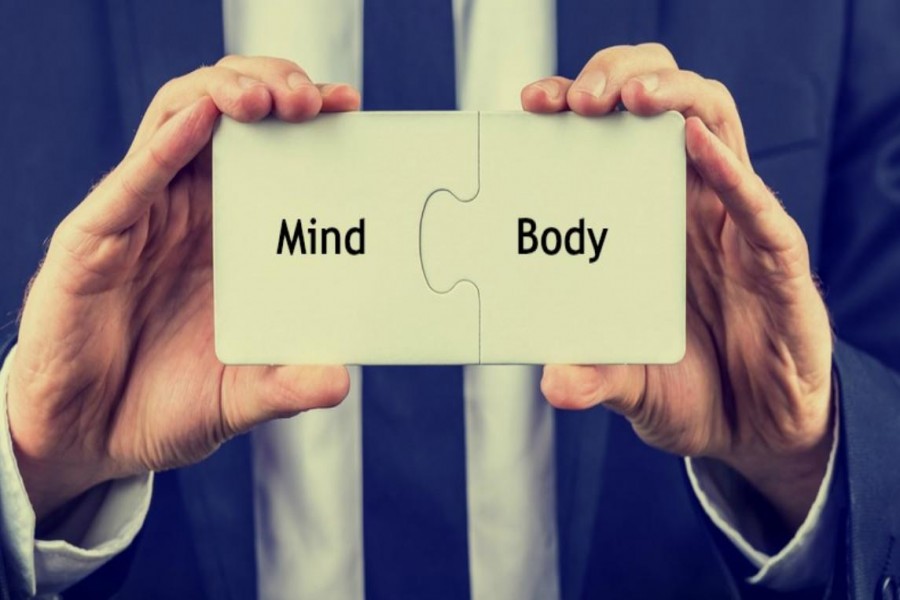
Published :
Updated :

The question of whether it is the mind or the body that pulls the strings of the self is still inconclusive.
At least for once in our lives, the question of our existence must have come to our minds. In this enormous universe, why in this tiny planet have we, the humans, come into existence? This question has tormented the mankind ever since they began to dive into deeper thoughts. The answer is yet to be found, though many philosophers have their own explanations.
The Latin phrase ‘Cogito ergo sum’ (‘I think, therefore I am’) was coined by the 16th century French philosopher René Descartes who put before us the mind-body dilemma. He asked the question that even if our physical sensations were just a hallucinatory dream, would our mind and thoughts still be there or not?. This resulted in the birth of the Cartesian Dualism.
Descartes claimed that the conscious mind is something separate from the material body which forms the core of our identity. According to him, there is a two-way interaction between mental and physical elements, and this interaction occurs only at one point of the body – the pineal gland. Therefore, this dualism proposes that the mind controls the body, but the body can also influence the conscious mind.
Let’s ponder upon another question – how well do our minds know our bodies? To understand this, an experiment called the Rubber Hand Illusion was conducted by some Italian researchers. It is a trick performed on a group of volunteers to explore how the mind combines information from the senses to create a feeling of body ownership.
The volunteers were asked to sit with their both hands on a table. A rubber hand was placed in front of them isolating one of their hands with a partition. Both hands, rubber and isolated, were then stroked with a paint brush at the same time. While the volunteers were well aware that the dummy hands were not theirs, they eventually started to feel like they were and even flinched when the dummy hands were attacked with a knife. Strange, isn’t it? It may be just a trick but it paints a bigger picture that our physical bodies and our conscious minds are bonded in a complex, tangled relationship. Which one of these is in charge then?
While philosophers like Descartes claimed that the mind is a separate entity, biologists and behaviourists argue that the mind is the brain with its structure, cells, and neural connections. According to them, the human mind is formed and shaped through its contact with the world i.e. society, environment, weather, education, etc. Radical behaviourists believe that the mind does not even exist.
The behaviourist and biological approaches believe in Materialistic Monism which claims that ultimately the mind and the brain are the same thing. However, their approach contradicts the phenomenon of hypnosis. According to a study by Hilgard and Orne, some participants through unconscious hypnotic suggestion were told that they would be touched with a ‘burning hot’ piece of metal when they were actually touched with a pencil. The participants in a deep trance had skin reactions like water blisters just as if they had been touched with burning metal. This is an example of the mind controlling the body’s reaction.
Many religions believe in the notion that the body is only a temporary shell for an immaterial soul. That human beings were sent to the earth for a greater purpose – serving the supreme heavenly force so that their souls may rest in peace in heaven in the afterlife. Viewing it from this perspective, some different questions arise. What is a soul? Is it the non-physical mind that can work beyond the limited bodily functions? How can the mind work beyond just bodily functions?
Well, what is known for certain is that even though we cannot see mind without a body present, what we can see are its legacies such as art and poetry, discovery and ideas, in paper and painting, books and sculpture, plays and movies. These are simply the bits and pieces of their mind still alive and existing while their creators might not be bodily existent. Every accomplishment in the human history has involved the mind. Some believe that there can be a mind without a body. Some have argued on the basis of quantum mechanics that the mind is an open system and can work more wonders than it already does.
The question of whether it is the mind or the body that pulls the strings of the self is still inconclusive, haunting the scientists. But yet another great mind, Walt Whitman said regarding the self, “There is, in sanest hours, a consciousness, a thought that rises, independent, lifted out from all else, calm, like the stars, shining eternal. This is the thought of identity — yours for you, whoever you are, as mine for me. Miracle of miracles, beyond statement, most spiritual and vaguest of earth’s dreams, yet hardest basic fact, and only entrance to all facts.”
The writer is a BSS student at Dhaka University.
mariahchowdhury.mc@gmail.com


 For all latest news, follow The Financial Express Google News channel.
For all latest news, follow The Financial Express Google News channel.